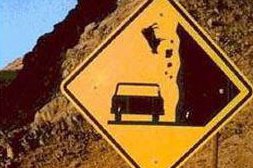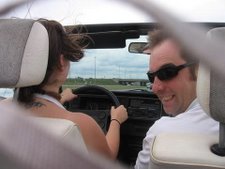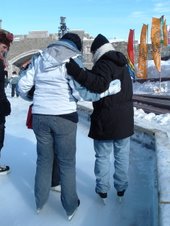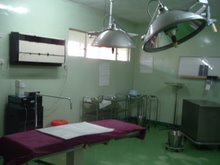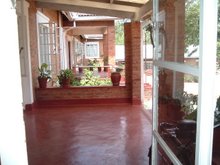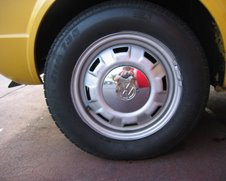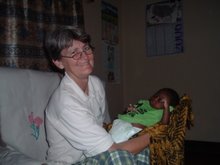beer
POM bread
cup-a-soup/ramen
marshmallows
KD
tangerines/peaches/apples
weenies+buns+ketchup
peanut butter
marshmallows
raspberry jam
beer
cheese
sliced ham
miss vickies
milk, salt, oil, teabags, whisky
marshmallows
oh, and beer
2006-08-30
2006-08-27
Cleaning up the neighbourhood
Currently at Brulerie St-Denis with a fantabulous "Chocolaccino."
Mmmm, foamed milk and chocolate sprinkles....
There was a great article in the Montreal Gazette today about a town called Grand Maman in New Brunswick. It's a small town with an out-of-proportion drug problem. The entire community is aware of the people who have been encouraging this, and have identified a few "crack houses."
On July 22, things reached a boiling point and mob justice prevailed. Someone apparently set alight this "crack house," and the community members prevented the fire trucks from reaching the house to extinguish the flames. Nobody was hurt, but the house was completely destroyed.
What have our fine lawmakers done? They have made a point of a "show of force," sending 70 RCMP to protect the home of a second drug dealer when rumours were spread that the same thing might happen again.
They have charged the citizenry with various offences, including arson, and obstructing a public highway.
To their credit, they ordered the drug dealer to not return to the island and to stay away from all residents. But he's not in jail.
*sigh*
The Harper government is considering closing down the country's only safe-injection house, Insite, by simply allowing its permit to expire. Here in Montreal, the police routinely plant themselves in a cruiser immediately outside a needle-exchange. Not exactly a welcoming sight for peoople making an effort to protect themselves in the worst of circumstances.
What are they trying to prove?
Mmmm, foamed milk and chocolate sprinkles....
There was a great article in the Montreal Gazette today about a town called Grand Maman in New Brunswick. It's a small town with an out-of-proportion drug problem. The entire community is aware of the people who have been encouraging this, and have identified a few "crack houses."
On July 22, things reached a boiling point and mob justice prevailed. Someone apparently set alight this "crack house," and the community members prevented the fire trucks from reaching the house to extinguish the flames. Nobody was hurt, but the house was completely destroyed.
What have our fine lawmakers done? They have made a point of a "show of force," sending 70 RCMP to protect the home of a second drug dealer when rumours were spread that the same thing might happen again.
They have charged the citizenry with various offences, including arson, and obstructing a public highway.
To their credit, they ordered the drug dealer to not return to the island and to stay away from all residents. But he's not in jail.
*sigh*
The Harper government is considering closing down the country's only safe-injection house, Insite, by simply allowing its permit to expire. Here in Montreal, the police routinely plant themselves in a cruiser immediately outside a needle-exchange. Not exactly a welcoming sight for peoople making an effort to protect themselves in the worst of circumstances.
What are they trying to prove?
2006-08-25
2006-08-24
2006-08-23
Sometimes I feel like....
Sometimes I feel like I've been had.
To do medicine in Canada, you have to be the top of your class. You have to be motivated. You have to be involved with the community. You have to really want to do it.
Sometimes I feel like medical school is our teachers' way of saying: "You think you're so smart?"
Okay, put on this glove and put your finger up that guy's butt.
How smart do you feel now?
To do medicine in Canada, you have to be the top of your class. You have to be motivated. You have to be involved with the community. You have to really want to do it.
Sometimes I feel like medical school is our teachers' way of saying: "You think you're so smart?"
Okay, put on this glove and put your finger up that guy's butt.
How smart do you feel now?
2006-08-22
Studying
It's hard to get motivated to study for the psychiatry exam now that:
a. It's summer.
b. There are kayaks.
c. I have absolutely decided I want to do surgery. Or obstetrics. Or something else that isn't psychiatry.
*sigh*
Here I come, DSM-IV!
a. It's summer.
b. There are kayaks.
c. I have absolutely decided I want to do surgery. Or obstetrics. Or something else that isn't psychiatry.
*sigh*
Here I come, DSM-IV!
2006-08-18
You know you are meant to be a surgeon if....
1. The word biopsychosocial gives you a rash.
2. You consider faking sick every Tuesday for the next six weeks, because that's your Clinic Day.
3. ...and you're pretty sure you wouldn't be missed anyhow.
4. You spontaneously come up with evil nicknames for your Internal Med rotation (my personal favourite, predictably: Infernal Medicine).
5. You don't get psychiatry. At all. Not even a little bit.
6. Your reaction when your delirious patient turns out to have an abscess, and leaks pus everywhere: Fantastic! Now she'll get better!!
7. Even after six months, you still love your scrubs.
8. Crocs!
9. You now know that coffee is an ART.
10. You actually say the words "Why don't they just take it out?" ....in a nephrology lecture (yes, Mitch, that's you).
11. Two words: "Hot surgeons"
12. Left alone, you invariably switch the TV to the open heart surgery on TLC.
13. Your role model: Dr. Nick.
14. You can say the words: "Splenectomy, cool!" and mean it. Even at three am.
15. As a kid, you were the one peeling off the bandaids and saying, "Can I see it?"
16. More to come...
2. You consider faking sick every Tuesday for the next six weeks, because that's your Clinic Day.
3. ...and you're pretty sure you wouldn't be missed anyhow.
4. You spontaneously come up with evil nicknames for your Internal Med rotation (my personal favourite, predictably: Infernal Medicine).
5. You don't get psychiatry. At all. Not even a little bit.
6. Your reaction when your delirious patient turns out to have an abscess, and leaks pus everywhere: Fantastic! Now she'll get better!!
7. Even after six months, you still love your scrubs.
8. Crocs!
9. You now know that coffee is an ART.
10. You actually say the words "Why don't they just take it out?" ....in a nephrology lecture (yes, Mitch, that's you).
11. Two words: "Hot surgeons"
12. Left alone, you invariably switch the TV to the open heart surgery on TLC.
13. Your role model: Dr. Nick.
14. You can say the words: "Splenectomy, cool!" and mean it. Even at three am.
15. As a kid, you were the one peeling off the bandaids and saying, "Can I see it?"
16. More to come...
2006-08-17
The Newbies
Ah, they're so cute. So fresh and enthusiastic.
So YOUNG. No, I'm serious, they're all about 19 or 20, or the group I met was.
Today I had my first meeting with the new group of first-year medical students. My university has this unique in Canada programme of "Med-P" which is where kids make the choice before entering university, and apply directly to medicine. Usually the kids of doctors, they often have a more complete view of what they are in for than do most nineteen-year olds. They do a one-year access course to give them the foundation in science and then they work like hell to catch up with people who have undergraduate- or graduate-level degrees.
They generally are more enthusiastic and energetic than the jaded graduates. They study harder, obsess about details and exams and how to pass. They all pass, of course: they're brilliant!
And they have no idea what else is out there.
Good luck, kids. Try and have some fun. Don't get old before your time.
So YOUNG. No, I'm serious, they're all about 19 or 20, or the group I met was.
Today I had my first meeting with the new group of first-year medical students. My university has this unique in Canada programme of "Med-P" which is where kids make the choice before entering university, and apply directly to medicine. Usually the kids of doctors, they often have a more complete view of what they are in for than do most nineteen-year olds. They do a one-year access course to give them the foundation in science and then they work like hell to catch up with people who have undergraduate- or graduate-level degrees.
They generally are more enthusiastic and energetic than the jaded graduates. They study harder, obsess about details and exams and how to pass. They all pass, of course: they're brilliant!
And they have no idea what else is out there.
Good luck, kids. Try and have some fun. Don't get old before your time.
The Language Police
For those of you who don't live in Quebec, you may think I am making this up. Those of you who do live here know I'm not.
Recent reports that the Office de la Langue Francaise has been out making sure that you can get your crappy coffee in French: spotted at a local Second Cup harassing the baristas. They passed, if you're interested.
Don't we have anything else to do with our tax money?
What's moccachino in French, anyhow?
Recent reports that the Office de la Langue Francaise has been out making sure that you can get your crappy coffee in French: spotted at a local Second Cup harassing the baristas. They passed, if you're interested.
Don't we have anything else to do with our tax money?
What's moccachino in French, anyhow?
2006-08-14
Toronto AIDS Conference
I did an elective in the ER of one of the local hospitals.
One patient who presented was a beautiful young lady of 19 who had some or another minor health problem that she wanted checked out, maybe a sore throat, I don't recall.
What I do recall was asking about her medical history, she had two interesting things to say: she was four months pregnant (and things were going just fine, thanks).
And she was HIV positive from birth.
According to the WHO, transmission rates in the absence of any intervention are 15-30% through pregnancy and delivery. These rates are reduced by half with basic intervention, giving this lady a greater than 90% chance of having a child who will not carry the HIV virus.
Hurrah for her. Such hope for the future for all of us.
And really, my best wishes,
wherever you are, lady.
______________________________
If you are wondering how I have time to write all of this, it's because I am currently doing a *yawn* psychiatry rotation. And half the staff are on vacation.
Go summer!
One patient who presented was a beautiful young lady of 19 who had some or another minor health problem that she wanted checked out, maybe a sore throat, I don't recall.
What I do recall was asking about her medical history, she had two interesting things to say: she was four months pregnant (and things were going just fine, thanks).
And she was HIV positive from birth.
According to the WHO, transmission rates in the absence of any intervention are 15-30% through pregnancy and delivery. These rates are reduced by half with basic intervention, giving this lady a greater than 90% chance of having a child who will not carry the HIV virus.
Hurrah for her. Such hope for the future for all of us.
And really, my best wishes,
wherever you are, lady.
______________________________
If you are wondering how I have time to write all of this, it's because I am currently doing a *yawn* psychiatry rotation. And half the staff are on vacation.
Go summer!
Who is your doctor?
One of my classmates, to me, commenting on another classmate:
"I don't know if someone who has a tattoo on her breast that can be seen when she wears her regular clothes should really be a doctor."
Do you agree?
What about body piercing? Tattoos that aren't visible when wearing professional attire?
Or something simpler: would you trust a doctor who wears jeans and a T-shirt to the office?
You know, he probably wished he had said that to someone else when he spotted my (more discreetly placed, but visible in scrubs) tattoo a week or so later. *Heh heh*
Update: I knew I couldn't be the only one doing this... and she's waaaaay funnier, check this out.
"I don't know if someone who has a tattoo on her breast that can be seen when she wears her regular clothes should really be a doctor."
Do you agree?
What about body piercing? Tattoos that aren't visible when wearing professional attire?
Or something simpler: would you trust a doctor who wears jeans and a T-shirt to the office?
You know, he probably wished he had said that to someone else when he spotted my (more discreetly placed, but visible in scrubs) tattoo a week or so later. *Heh heh*
Update: I knew I couldn't be the only one doing this... and she's waaaaay funnier, check this out.
2006-08-12
Last Call
Everyone's heard about being on call. Come on, you watch Gray's Anatomy, I know you do.
Have you heard of call karma? This is the mystic force which determines what happens every time you are on call. Everybody has it; some have it good and some have it bad. And you learn very quickly which you have.
I did a trauma rotation with a guy called Dan. Dan is in training as a physician assistant with the Canadian Armed Forces. Dan had the ultimate in good call karma:
"Just call me Buddha: rub my belly and nobody in the whole city gets hurt."
Great stuff if you need an uninterrupted night's sleep, but not so much if you have *finally* gotten a placement in a world-class trauma centre and are intending to get some practical training in how to deal with trauma.
Never mind. My theory is: when Dan gets licensed and sent to a war zone, we will have sudden and inexplicable world peace.
This post is dedicated to Dan, for sharing some of his call karma with me so I can write this while ostensibly on call, but in reality I am twiddling my thumbs and avoiding studying.
Which I intend to do, starting:
Now.
Have you heard of call karma? This is the mystic force which determines what happens every time you are on call. Everybody has it; some have it good and some have it bad. And you learn very quickly which you have.
I did a trauma rotation with a guy called Dan. Dan is in training as a physician assistant with the Canadian Armed Forces. Dan had the ultimate in good call karma:
"Just call me Buddha: rub my belly and nobody in the whole city gets hurt."
Great stuff if you need an uninterrupted night's sleep, but not so much if you have *finally* gotten a placement in a world-class trauma centre and are intending to get some practical training in how to deal with trauma.
Never mind. My theory is: when Dan gets licensed and sent to a war zone, we will have sudden and inexplicable world peace.
This post is dedicated to Dan, for sharing some of his call karma with me so I can write this while ostensibly on call, but in reality I am twiddling my thumbs and avoiding studying.
Which I intend to do, starting:
Now.
2006-08-11
The Big Decision
Okay, it may not seem like a big decision to most people who have just got on and done it. You know, finish school and find a job that you will be doing for the rest of your life, as in forever. Unless you decide to quit and get another job. But basically, most people pick something and stick with something in that general direction until they retire, no?
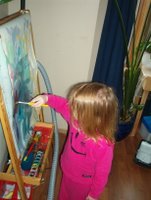
What do I know? All I seem to talk to most of the time are med students. Or teachers, but those come in two flavours: some knew from birth they wanted to teach; others never did figure out what they wanted to do so they figured they'd be teachers.
And so.
Surgery. Emergency. Family. Or even obstetrics. Radiology has its advantages. Internal medicine... no, I'm kidding, although infectious disease really appeals to me.
I very much envy the people who came into med school saying 'I want to be a neurosurgeon/anaesthesiologist/pathologist," who have come all this way, happily arranged electives, and are currently researching schools which have the best programmes for whichever was their calling.
My choices haven't changed much since the beginning, but my reasons have.
Obstetrics is so much fun. Exhausting because you just can't predict when the next patient will go into labour and so your days are looooooong and your nights disturbed. And there are babies! And they go home with mommy when they start to poop! But seriously, it's amazing to be involved with births, be it mum's first or fourteenth.
Family medicine is the most versatile of the degrees, with the added bonus of being a two-year plus fellowship residency as opposed to the others which are all five years plus fellowship. But you can do anything. If you can handle the clinics.
Emergency. Oooh. Set aside the romance factor that you see on ER (although there are quite a few hot emerg docs....), it's got the energy, the unpredictabiity. You need everything you ever learned in medical school, down to the smallest differential. You need the guts to act on your own, as well as the ability to work with a team. And the best part is, with rare exception, ER docs don't do call. They do their shift, they go home. Wow.
And well, surgery. I liked the idea of surgery because it was the thing that worked when everything else failed. It's the only cure for most cancers. But I kept getting warned away by people who were in surgery residencies who are unhappy and exhausted.
But then I did my surgery rotation. I was exhausted. I was overwhelmed by the arrogance of some surgeons, disgusted by the stunted personalities and by the rigid hierarchies the residents felt the need to enforce. I was stunned by the treatment of the senior residents by the staff under the guise of teaching them to practise clean and careful medicine.
And you know what? I loved it anyway. I had a great team that worked beautifully together under a young and vibrant staff surgeon. I learned that my immediate-gratification type personality was ideally suited to surgery, as was my hands-on attitude, and my memory based on doing. Most importantly I found that surgery would take me where I wanted to go: war zones, hurricane aftermath, crisis relief.
(And hot surgeons? Oh, baby!)
I have three electives planned and a fourth in-process, all surgical. I have so much to learn. So wish me luck.

What do I know? All I seem to talk to most of the time are med students. Or teachers, but those come in two flavours: some knew from birth they wanted to teach; others never did figure out what they wanted to do so they figured they'd be teachers.
And so.
Surgery. Emergency. Family. Or even obstetrics. Radiology has its advantages. Internal medicine... no, I'm kidding, although infectious disease really appeals to me.
I very much envy the people who came into med school saying 'I want to be a neurosurgeon/anaesthesiologist/pathologist," who have come all this way, happily arranged electives, and are currently researching schools which have the best programmes for whichever was their calling.
My choices haven't changed much since the beginning, but my reasons have.
Obstetrics is so much fun. Exhausting because you just can't predict when the next patient will go into labour and so your days are looooooong and your nights disturbed. And there are babies! And they go home with mommy when they start to poop! But seriously, it's amazing to be involved with births, be it mum's first or fourteenth.
Family medicine is the most versatile of the degrees, with the added bonus of being a two-year plus fellowship residency as opposed to the others which are all five years plus fellowship. But you can do anything. If you can handle the clinics.
Emergency. Oooh. Set aside the romance factor that you see on ER (although there are quite a few hot emerg docs....), it's got the energy, the unpredictabiity. You need everything you ever learned in medical school, down to the smallest differential. You need the guts to act on your own, as well as the ability to work with a team. And the best part is, with rare exception, ER docs don't do call. They do their shift, they go home. Wow.
And well, surgery. I liked the idea of surgery because it was the thing that worked when everything else failed. It's the only cure for most cancers. But I kept getting warned away by people who were in surgery residencies who are unhappy and exhausted.
But then I did my surgery rotation. I was exhausted. I was overwhelmed by the arrogance of some surgeons, disgusted by the stunted personalities and by the rigid hierarchies the residents felt the need to enforce. I was stunned by the treatment of the senior residents by the staff under the guise of teaching them to practise clean and careful medicine.
And you know what? I loved it anyway. I had a great team that worked beautifully together under a young and vibrant staff surgeon. I learned that my immediate-gratification type personality was ideally suited to surgery, as was my hands-on attitude, and my memory based on doing. Most importantly I found that surgery would take me where I wanted to go: war zones, hurricane aftermath, crisis relief.
(And hot surgeons? Oh, baby!)
I have three electives planned and a fourth in-process, all surgical. I have so much to learn. So wish me luck.
2006-08-10
Happy Mom or Control Freak?
I was, I admit, looking for seomething else when I ran across this.
Okay, I sympathise with her. Everyone wants a happy, healthy birth experience. Can I tell you how it feels from the other side?
I spent two months assisting at deliveries at a fab hospital. Great delivery rooms, great nurses, variable but largely fantastic docs. The role of the student changed as we got more experience. We started by doing initial assessments, cervical exams, fetal heart monitoring; we spent a great deal of time with mums and really developed trust. During the second month, we were often the ones who did the actual delivery, with the doc standing by to ensure that we did not make mistakes and there for us and for the mum in case of emergency.
The mums with the eight-page birthing plans were generally considered to be the bane of the labour ward's existence. The nurses often took such plans as an affront to their professionalism, and a sign that the patient had unrealistic expectations of the birth. Such plans set up an adversarial relationship right from the start, and when your nurse is going to be your main caregiver and coach for this most important of events (and don't kid yourselves, in my experience male partners are great but rarely are they a load of help in the delivery room, mostly they just piss off the woman having the baby at some point; nurses REALLY get it), it's kind of a good idea to have the nurse on your side.
Obviously nobody wants the birth of their child to be medicalised, treated like a sickness. But most people want the security of a hospital just in case. Surely, anyone who cares enough to make a birthing plan like this also cares enough to discuss the reasons behind an episiotomy, a forceps delivery, or a caesarean with their doctor so they understand when and why each decision is made and can come to an agreement, rather than writing it down in a manner that suggests without such a plan the trusted obstetrician would just be out of control.
In a modern labour ward, most of this birthing plan is standard practise anyhow.
The point of all this is that a mum who comes to the labour ward with a list of demands has come in with the wrong attitude. She has set herself up to get upset about the little things rather than to appreciate the experience and to appreciate the people she needs there with her.
_________________________________________________________
On a related note:
While I was delivering those babies, nearing the end of my two months, a lady came in expecting twins. In active labour, yada yada...
I was soooo excited. I could relate to this lady; I come from a family with huge numbers of multiple births, twins and triplets. I'm kind of convinced that if I ever get pregnant, it's likely to be twins (I know that's ridiculous, but...).
I was thrilled, and I asked to participate in the birth. And out came the birthing plan. I was "excess personnel" it seemed. No medical students allowed. Oh cheerio. I suppose it didn't matter in the end, I certainly would never have been able to develop a therapeutic relationship with this woman who spent all of her time in labour shouting at her nurses, swearing at her husband, and being rude to the doctor. She even tried to throw out the resuscitation teams who were present for her babies' sake! She got upset about everything.
I was sad for her way more than for me in the end; her experience was miserable.
Okay, I sympathise with her. Everyone wants a happy, healthy birth experience. Can I tell you how it feels from the other side?
I spent two months assisting at deliveries at a fab hospital. Great delivery rooms, great nurses, variable but largely fantastic docs. The role of the student changed as we got more experience. We started by doing initial assessments, cervical exams, fetal heart monitoring; we spent a great deal of time with mums and really developed trust. During the second month, we were often the ones who did the actual delivery, with the doc standing by to ensure that we did not make mistakes and there for us and for the mum in case of emergency.
The mums with the eight-page birthing plans were generally considered to be the bane of the labour ward's existence. The nurses often took such plans as an affront to their professionalism, and a sign that the patient had unrealistic expectations of the birth. Such plans set up an adversarial relationship right from the start, and when your nurse is going to be your main caregiver and coach for this most important of events (and don't kid yourselves, in my experience male partners are great but rarely are they a load of help in the delivery room, mostly they just piss off the woman having the baby at some point; nurses REALLY get it), it's kind of a good idea to have the nurse on your side.
Obviously nobody wants the birth of their child to be medicalised, treated like a sickness. But most people want the security of a hospital just in case. Surely, anyone who cares enough to make a birthing plan like this also cares enough to discuss the reasons behind an episiotomy, a forceps delivery, or a caesarean with their doctor so they understand when and why each decision is made and can come to an agreement, rather than writing it down in a manner that suggests without such a plan the trusted obstetrician would just be out of control.
In a modern labour ward, most of this birthing plan is standard practise anyhow.
The point of all this is that a mum who comes to the labour ward with a list of demands has come in with the wrong attitude. She has set herself up to get upset about the little things rather than to appreciate the experience and to appreciate the people she needs there with her.
_________________________________________________________
On a related note:
While I was delivering those babies, nearing the end of my two months, a lady came in expecting twins. In active labour, yada yada...
I was soooo excited. I could relate to this lady; I come from a family with huge numbers of multiple births, twins and triplets. I'm kind of convinced that if I ever get pregnant, it's likely to be twins (I know that's ridiculous, but...).
I was thrilled, and I asked to participate in the birth. And out came the birthing plan. I was "excess personnel" it seemed. No medical students allowed. Oh cheerio. I suppose it didn't matter in the end, I certainly would never have been able to develop a therapeutic relationship with this woman who spent all of her time in labour shouting at her nurses, swearing at her husband, and being rude to the doctor. She even tried to throw out the resuscitation teams who were present for her babies' sake! She got upset about everything.
I was sad for her way more than for me in the end; her experience was miserable.
2006-08-09
A Confession and a Question
I have a confession to make.
I am not a doctor yet. One more year to go. Lots and lots to learn. Lots of sleep to be deprived of, lots of friends to not talk to, lots of life to miss out on and then to rediscover at some as yet undetermined future time when things will settle down (or so I am assured).
This blog is my way to think outside the books.
I hope it will contain discussions about Canadian healthcare, international health, residency in different specialties, whatever. Maybe people who are a little farther along can offer some advice.
What's been on my mind recently is predictable enough: CaRMS, the match, interviews. We had a meeting at our med school recently, and the topic of illegal questions was broached. Apparently many female first-year residents said that at some point during their numerous interviews, they were asked the following: "Do you intend to have children during residency?"
Do you have any recourse if you get asked something like that?
Who will believe you if you say no? Should you say no? Should you say yes?
The only thing I have figured out for sure is that getting up and storming out is not the best option.
I am not a doctor yet. One more year to go. Lots and lots to learn. Lots of sleep to be deprived of, lots of friends to not talk to, lots of life to miss out on and then to rediscover at some as yet undetermined future time when things will settle down (or so I am assured).
This blog is my way to think outside the books.
I hope it will contain discussions about Canadian healthcare, international health, residency in different specialties, whatever. Maybe people who are a little farther along can offer some advice.
What's been on my mind recently is predictable enough: CaRMS, the match, interviews. We had a meeting at our med school recently, and the topic of illegal questions was broached. Apparently many female first-year residents said that at some point during their numerous interviews, they were asked the following: "Do you intend to have children during residency?"
Do you have any recourse if you get asked something like that?

Who will believe you if you say no? Should you say no? Should you say yes?
The only thing I have figured out for sure is that getting up and storming out is not the best option.
Subscribe to:
Comments (Atom)
